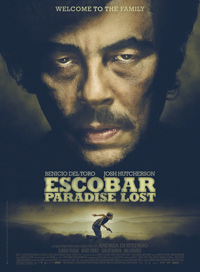Drug War Diaries: Di Stefano’s Peripheral Take on Famed Drug Lord’s Activities
 For those wishing to learn much of anything about famed Colombian drug lord Pablo Escobar, the logical place to start is not with Andrea Di Stefano’s feature directorial debut, Escobar: Paradise Lost, a starry depiction relegating its titular drug titan to the sidelines. True, there are aspects worthy of admiration, thanks mostly to moments with a paunchy Benicio Del Toro as the notorious “King of Cocaine.” But Di Stefano chooses to focus on the perspective of a token white outsider, presented in a formula used to design mainstream comedies—idealistic young man meets sexy young woman, inadvertently leading to his involvement with her ‘kooky’ familial environment.
For those wishing to learn much of anything about famed Colombian drug lord Pablo Escobar, the logical place to start is not with Andrea Di Stefano’s feature directorial debut, Escobar: Paradise Lost, a starry depiction relegating its titular drug titan to the sidelines. True, there are aspects worthy of admiration, thanks mostly to moments with a paunchy Benicio Del Toro as the notorious “King of Cocaine.” But Di Stefano chooses to focus on the perspective of a token white outsider, presented in a formula used to design mainstream comedies—idealistic young man meets sexy young woman, inadvertently leading to his involvement with her ‘kooky’ familial environment.
In 1991, Colombian drug lord Pablo Escobar (Del Toro) has resigned himself to the fact he must turn himself into authorities. He rallies a small crew together, including nephew-in-law Nick (Josh Hutcherson), to hide a bunch of loot and murder those who help stash it. We back up to an earlier date in time where the happy white Canadian lad is surfing on the Colombian beaches and hanging out in the jungle with his brother (Brady Corbet). They’re accosted by some local thugs, and luckily Nick meets and romances Maria (Claudia Traisac), whose uncle happens to be Escobar. As their romance deepens, so does Nick’s wary allegiance to the affable criminal.
It’s a set up reminiscent of Kevin Macdonald’s depiction of Idi Amin in The Last King of Scotland, wherein we journey into a drastic realm with the assistance of a white guide, James McAvoy. But as enjoyable as Del Toro is as the powerful drug lord, his onscreen moments are generally borderline comical in the first half of the film. Di Stefano doesn’t bother charting a logical mounting tension, quickly turning the tables for a familiar betrayal once Nick is marked as no longer integral to Escobar’s operations. But their initial interactions hold promises of potency, as we learn his new uncle-in-law has a tendency to take care of his family’s problems without being asked.
Those thugs plaguing Nick and his brother in the jungle? After a quick note to himself written on the inside of his hand, Escobar has them burned and hanged upside down. But Di Stefano insists on returning to the incident two more times in verbal exchanges, ruining whatever little subtleties pop up along the way.
In the realm of cinematic drug lords, Del Toro’s performance isn’t given the chance it needs to stand out, especially compared to a similarly styled performance in Denis Villeneuve’s Sicario, which will see theatrical release the same year. He’s used more as a crutch here, since little enthusiasm is built around Hutcherson’s one note Nick and his wan romance with Claudia Traisac, whose presence fails to register. Likewise, Brady Corbet, Carlos Bardem and Ana Girardot feel wasted in supporting roles.
On a technical level, Escobar seems comfortably assured, though DoP Luis David Sansans doesn’t bring the same flair as with 2011’s Days of Grace (a title that just recently saw a limited theatrical release earlier this year).
★★/☆☆☆☆☆


